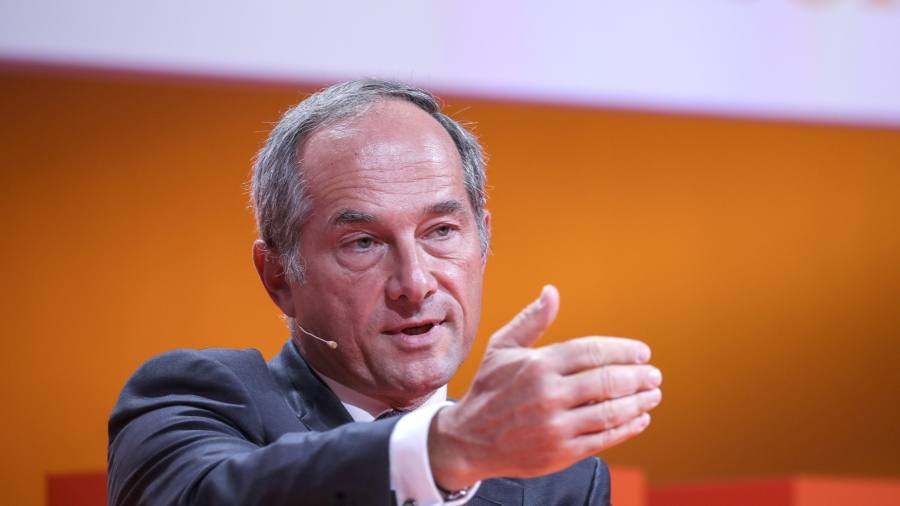The outgoing chief of France’s Société Générale’s has dismissed the risk of US banking turmoil spreading to Europe, arguing the region’s tougher regulation was a “fundamental contrast” that helped shield the sector.
Frédéric Oudéa, who is stepping down this month after 15 years at the helm of the bank, said he was “confident the European banking sector would continue to be extremely solid in the coming quarters”.
In the US, he added: “I think that turbulence could continue.”
“You have a lot of smaller and medium-sized banks [in the US] that are not regulated in the same way as in the eurozone and Europe, where you have stability derived from having a framework that takes in to account all these crisis simulations,” Oudéa said after SocGen posted higher profits for the first quarter.
The eurozone’s banking regime has remained fundamentally the same since its introduction in the aftermath of the 2008 financial crisis, whereas former president Donald Trump rolled back some stress tests and requirements for smaller US banks with assets of up to $250bn.
Such institutions now do not have to take into account some unrealised losses on assets in their capital requirements, particularly in their bond portfolios.
The US has suffered several bank failures in recent weeks, but Credit Suisse and the much smaller UK business of Silicon Valley Bank are the only European lenders to come close to collapse.
Second-tier European banks have also not suffered the same level of customer withdrawals as US regional lenders, mainly because their deposit bases are less concentrated.
“You’ve seen deposits at some US banks drop by 10 per cent in a week . . . look at how exceptionally sticky deposits have been across all the big eurozone banks,” Oudéa added. “There’s a fundamental contrast here.”

Failed US lenders such as SVB and Signature Bank had high levels of clients in the tech sector, many of whom withdrew their deposits at the same time. Regulators have highlighted the interconnected nature of such customers and the role social media played in spreading rumours about the banks’ problems.
The US banking market also has a higher level of competition for deposits from other savings products such as money market funds. More than $340bn flowed into US money market funds in March — the highest rate since the start of the Covid-19 pandemic three years ago — much of which came from regional banks.
By contrast, European banks have maintained high levels of liquidity, highlighted by UBS taking on Credit Suisse and HSBC absorbing SVB UK, and other lenders, such as UniCredit, boosting shareholder returns.
“European banks do not exhibit a combination of large unrealised losses on securities portfolios and highly confidence-sensitive funding models,” S&P analyst Giles Edwards said in a recent report. He added that the Credit Suisse takeover by UBS was a unique case due to specific “business and risk management deficiencies”.
Some European banks initially suffered when tech-focused SVB collapsed in mid-March, with investors taking flight even though few were directly exposed to the California-based bank. Since then, retail deposits across Europe have shown little sign of being depleted.
The heavy outflows suffered by Credit Suisse in the days leading up to its rescue by rival UBS in March were mainly in its wealth management arm.
Banks in Europe have a lower exposure to troublesome commercial real estate than their US peers, representing about 8 per cent of the loan books at European lenders, compared with 18 per cent at US banks and 36 per cent for mid-cap US lenders, according to Jefferies.
Oudéa said commercial real estate was “probably a sector with risks” in the US, but SocGen said on Friday its exposure to the sector stood at 3.2 per cent of its total, with the bulk skewed towards Europe.
This month, SocGen’s investment bank chief Slawomir Krupa is set to replace Oudéa, who took over as chief executive in 2008 after a rogue trading scandal, if shareholders approve the appointment.
Part of Krupa’s mandate will be to try and revive a share price that has never recovered since the financial crisis, in spite of several restructurings. SocGen’s share price slumped 26 per cent in March and has only partially recovered since, up 13 per cent.
Rising interest rates have caused some issues for European banks, even though broadly they should boost margins. In France, for instance, caps on the rate at which mortgages can be repriced is damping the benefits for lenders and making it harder to offer home loans.
SocGen on Friday reported a slight increase in deposits compared with the first quarter of last year. It said mortgage origination in France had fallen from a year earlier. Net income was up 5.7 per cent in the first three months of the year to €868mn, ahead of forecasts.
“French retail revenues in the short term continue to show pressure,” Barclays analyst Amit Goel said of the results, adding, however, that the bank’s performance had been solid in investment banking.
Strong bond trading revenues and lower charges on non-performing loans during the quarter helped SocGen offset sliding revenues in its French retail bank — one area that it said was likely to underperform throughout 2023.


